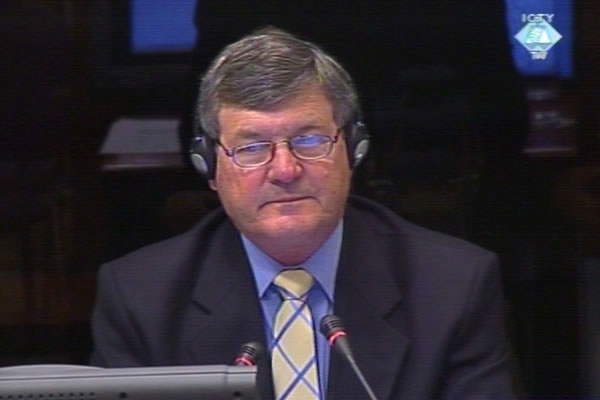Home
KARADZIC DEFENDS MLADIC
Continuing his cross-examination of John Wilson, Radovan Karadzic tried to prove that General Ratko Mladic’s threat to ‘raze Sarajevo to the ground’ on 25 May 1992 was ‘just a bluff’. Karadzic argued that the recording of the intercepted conversation in which, three days later, Mladic ordered his troops to open fire on Velesici, Pofalici and other parts of Sarajevo was ‘fabricated’
 John Wilson, witness at the Radovan Karadzic trial
John Wilson, witness at the Radovan Karadzic trial Radovan Karadzic continues his cross-examination of the former head of the UN military observers in BH John Wilson. Karadzic first wanted to prove that General Ratko Mladic’s threat to ‘raze Sarajevo to the ground’ was nothing but a ‘bluff’ by Mladic; the purpose was to ensure the safe evacuation of the JNA soldiers from their barracks in Sarajevo.
Mladic threatened to ‘raze Sarajevo to the ground’ at a meeting with the witness on 25 May 1992, asking Wilson to pass the threat on to the BH presidency. According to the witness, Mladic fulfilled his threat by launching a fierce artillery attack on Sarajevo in the afternoon of 28 May 1992. The shelling was ‘indiscriminate’ and as far as the witness remembered, it continued far on in the night.
At a meeting in the BH Presidency, the witness heard a recording of an intercepted conversation between General Mladic and his subordinate officer Mirko Vukasinovic. The conversation took place on 28 May 1992. Mladic asked, ‘where’s the best shelling coming from’, and then orders his artillery to fire on Velesici and Pofalici. ‘There are not many Serb folks there’, Mladic said. He also wanted the gunners to fire on other parts of the city to ‘drive the people of Sarajevo crazy’.
Karadzic implied that the conversation was ‘fabricated’, claiming that it was not Mladic’s voice in the recording but a skillful ‘imitator’. Karadzic referred today to another intercepted conversation in which Mladic told one his officers, Potpara, that the other side has ‘pantomime artists or some good imitators’ who have imitated his and other people’s voices to ‘fool their people’.
The witness said that General Boskovic and Colonel Cadjo, high-ranking JNA officers, confirmed that it was really General Mladic’s voice in the recording of 28 May 1992 and that Mladic personally commanded the artillery attack on Sarajevo in the night of 28 May 1992. The witness and the two JNA officers met immediately after the shelling. Karadzic contested this claim. According to Karadzic, there was a ‘fierce clash’ between Mladic and the two JNA officers because they left the weapons behind in the barracks as they pulled out and the weapons thus fell into enemy hands.
‘I know that Mladic’s view of the evacuation of the barracks was not to leave any weapons behind and I know that General Panic – Mladic’s senior officer – issued the order to evacuate soldiers and leave the weapons behind’, the witness said. The witness added that Mladic was very clear with him, telling him that ‘he is not the one who surrenders the weapons but the JNA’.
Karadzic also quoted from an intercepted conversation that took place on 29 May 1992. In the recording, Mladic says to one of his officers: ‘We will not open fire on the city if they don’t breach agreements, unless we come under threat. But be very cautious, don’t trust them one bit’. ‘Is it not clear that Mladic wanted to avoid having to open fire?’, Karadzic asked the witness.
‘This is what the document says’, Wilson responded, adding that at the meeting general Mladic made it clear to him that he intended to attack the city unless the barracks were evacuated. The witness then informed his superiors. ‘Words are not worth much, Mr. Karadzic, it’s the deeds that count,’ the witness remarked.
Karadzic then said that Mladic was forced to ‘send harsher messages’ to the other side after the ‘massacres’ of the JNA soldiers on 2 and 3 May 1992 in Sarajevo and on 15 May 1992 in Tuzla. According to Karadzic, Mladic was forced to threaten with retaliation at the meetings, while at the same time he warned his soldiers to remain calm and not to respond to the enemy ‘provocations’.
In his defense of Mladic, Karadzic said that he ‘made efforts to prevent innocent people from getting hurt’. Wilson disagreed, saying that Mladic’s actions actually ‘resulted in the death of many persons’.
Linked Reports
- Case : Karadzic
- 2010-06-21 KARADZIC’S ‘CARE’ FOR CIVILIANS IN SARAJEVO
- 2010-06-16 KARADZIC’S CLEARING UP ‘MISCONCEPTIONS’
- 2010-06-15 KARADZIC’S DOCTRINE OF ‘ARMED PEOPLE’
- 2010-06-23 WHAT THE WITNESS ‘HAD TO KNOW’
- 2010-06-28 MAINTAINING ATMOSPHERE OF TERROR IN SARAJEVO
- 2010-06-29 KARADZIC’S ‘ACCURATE AND DETAILED EVIDENCE’
